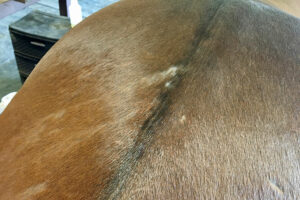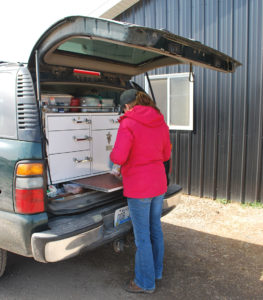
Treating Rain Rot in Horses That Live Outside
An equine dermatology expert describes what causes rain rot in horses and how you can prevent and manage it in horses on full-time turnout.


An equine dermatology expert describes what causes rain rot in horses and how you can prevent and manage it in horses on full-time turnout.

Dr. Rosanna Marsella outlines the difference between these treatments and how you can determine which to use.

Back pain and topline dysfunction can shorten horses’ careers. Learn how one veterinarian diagnoses and treats this soundness problem.

Dr. Susan White explains how owners can manage horses with a history of chronic scratches.

Two biosecurity experts share the best ways you can protect your horse from disease, whether you plan to travel with him or he never leaves the farm.

Create a systematic training program to help you and your horse reach goals while minimizing your horse’s risk of injury and mental burnout.

Discover how 2 experts identify and treat skin problems in horses. Sponsored by KineticVet.

An expert reviews material showing 2.5% polyacrylamide hydrogel (PAAG) is effective, long-lasting, and safe for treating early- and late-stage equine osteoarthritis. Sponsored by Contura Vet.

How certified veterinary technicians and veterinary assistants improve equine practices.

Veterinarians share how they improve sustainability and work-life balance in their practices and how you can implement these ideas in yours.

3 veterinarians share suggestions for improving your practice’s payment procedures.

Diversity is vital to workplace satisfaction and improved patient care within the equine veterinary profession. Learn practical steps for improving practice diversity.

When mentoring equine veterinary students, veterinarians should combine hands-on learning methods and verbal explanations.

Fluorescent light energy (FLE) promotes healing and provides antimicrobial activity and anti-inflammatory effects in equine wounds and skin conditions.

Many equine veterinarians experience moral distress at least once in their career. Learn why this happens and how you can cope.

Equine standing CT is an accurate diagnostic imaging tool that could make CT safer and more accessible due to its ease of use.
Stay on top of the most recent Horse Health news with